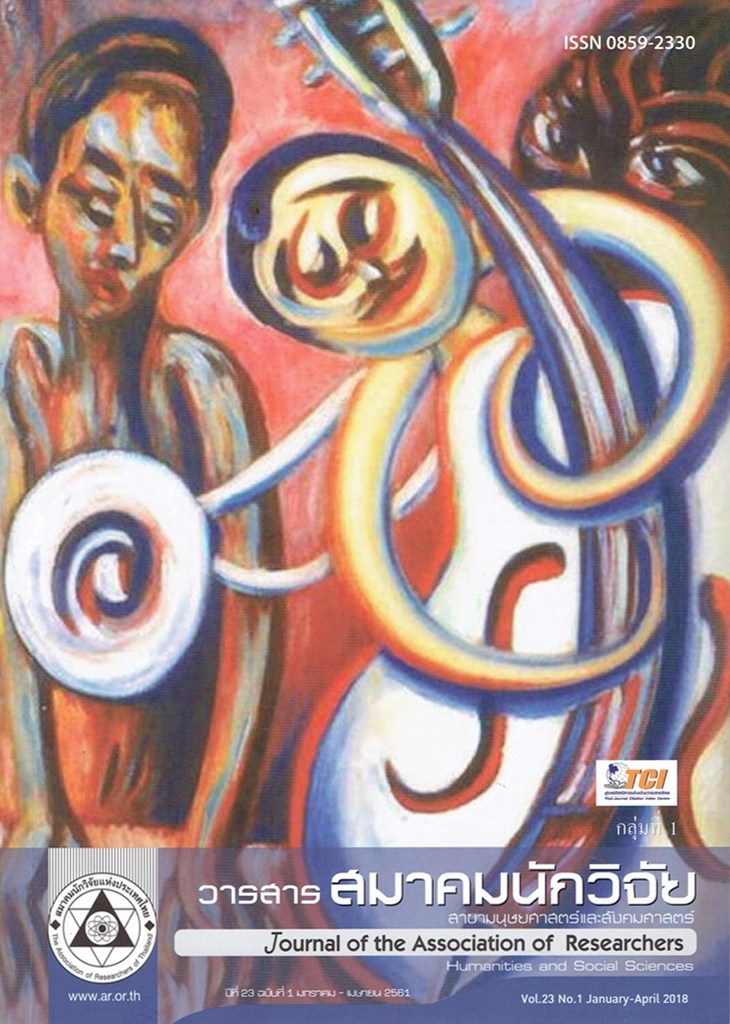Influences of Strategic Leadership and Organizational Citizenship Behavior on Organizational Loyalty of Noncommissioned Officers in Army Air Defense Command, Bangkok Metropolitan
Main Article Content
Abstract
The objectives of this research were 1) to study level and relationship among strategic leadership organizational citizenship behavior and organizational loyalty 2) to study the influence of strategic leadership on organizational citizenship behavior 3) to study the influence of strategic leadership on organizational loyalty both direct and indirect via organizational citizenship behavior and 4) to study the influence of organizational citizenship behavior on organizational loyalty. Sample was noncommissioned officers in Army Air Defense Command, Bangkok Metropolitan area. Multi-stage sampling was applied, and completely sample size was 325. The research results found that every variables had a significant level at every variable. From structural equation modelling, strategic leadership had significantly influence on organizational citizenship behavior and variance predicted by strategic leadership at 91.0 percent. Strategic leadership had significantly direct effect on organizational loyalty and had indirect effect via organizational citizenship behavior and variance predicted by strategic leadership at 67.0 percent. Finally, organizational citizenship behavior had influence on the organizational loyalty with significantly. Fit indices of the model were χ2 / df = 0.688; CFI =1.00 ; NNFI = 1.00; RMSEA = 0.00; 90% CI for RMSEA = 0.00
Article Details
บทความที่ปรากฏในวารสารนี้ เป็นความรับผิดชอบของผู้เขียน ซึ่งสมาคมนักวิจัยไม่จำเป็นต้องเห็นด้วยเสมอไป การนำเสนอผลงานวิจัยและบทความในวารสารนี้ไปเผยแพร่สามารถกระทำได้ โดยระบุแหล่งอ้างอิงจาก "วารสารสมาคมนักวิจัย"
References
กระทรวงกลาโหม พ.ศ. 2513 (แก้ไขครั้งที่ 9) พ.ศ. 2533. กองทัพบก. (2525). ประวัติกองทัพบกไทยในรอบ 200 ปี พ.ศ. 2325-2525. กรุงเทพมหานคร: โรงพิมพ์กรมแผนที่ทหาร.
พิพัฒน์ นนทนาธรณ์. (2558). ภาวะผู้นำเชิงปฏิบัติการ: LIFE Model. พิมพ์ครั้งที่ 2. กรุงเทพฯ: ศูนย์ผู้นำธุรกิจเพื่อสังคม.
ศรัณย์รัชต์ สมรรคเสวี และ เกษมชาติ นเรศเสนีย์, (2559). “ภาวะผู้นำการปฏิรูป ความผูกพันต่อองค์การ และพฤติกรรม การเป็นสมาชิกที่ดีขององค์การของพนักงานในธุรกิจขนส่งสินค้าทางอากาศ : การวิเคราะห์เส้นทาง”. วารสาร สมาคมนักวิจัย. 21(3), 100-110
ปวาฬ ชลศรานนท์ และ พิพัฒน์ นนทนาธรณ์, (2559).”ภาวะผู้นำเชิงกลยุทธ์ ความรับผิดชอบต่อสังคม และภาพลักษณ์ องค์การของพนักงาน บริษัท เวิร์คพอยท์ เอ็นเทอร์เทนเมนท์จำกัด (มหาชน) : การวิเคราะห์เส้นทาง”.วารสาร สมาคมนักวิจัย. 21(3), 111-122
ฉตัรฤทยั อนิทโุศภน, (2559) .”อทิธพิลของภาวะผนู้ำการปฏริปู และจติสาธารณะ ทสี่ง่ผลตอ่พฤตกิรรมการเปน็สมาชกิทดี่ี ขององคก์ารใน รด.จติอาสา” .วทิยานพินธบ์รหิารธรุกจิมหาบณัฑติ สาขาวชิาบรหิารธรุกจิ มหาวทิยาลยัเกษตรศาสตร์
ณปภัช วิเศษชูชาติกุล และ พิพัฒน์ นนทนาธรณ์, (2559).”อิทธิพลของภาวะผู้นำใฝ่บริการของหัวหน้าหอผู้ป่วยและ พฤติกรรมการเป็นสมาชิกที่ดีขององค์การที่ส่งผลต่อประสิทธิผลของหอผู้ป่วยตามการรับรู้ของพยาบาลวิชาชีพ โรงพยาบาลพระมงกุฎเกล้า”. วารสารสมาคมนักวิจัย. 21(3), 75-84
References
Bratton, J., Grint, K., & Nelson, D. L. (2005). Organizational leadership. Mason, OH: SouthWestern
Publishing. Bass, B.M. (1985). Leadership and Performance Beyond Expectations. New York:
FreePress. Chatrutai Indusobhana, (2016). The Influence of Transformational Leadership and Public Mind on the Organizational Citizenship Behavior of the Volunteer Reserve Forces.
Master of Business Administration, Major Field: Business Administration. Kasetsart University. (in Thai).
Cohen, A. (2005).‚ The relationship between multiple commitments and organizational citizenship behavior in Arab and Jewish culture. Journal of Vocational behavior. 69 (1): 105-118.
Davis, K. (1982). Human Relation and Organization Behavior. Philippine: Press.
Dubrin, A. J. (2001). Leadership: Research Findings, Practice and Skills. 3rd ed. New York: Gibson, J. L., J. M. Ivancevicn, and J. H. Donnelly (1997). Organizations Behavior. 9th ed. Chicago: Irwin.
Greenberg, J. and R.A. Baron. (1997). Behavior in organizations (6th ed.). Upper Saddle River, NJ: Prentice Hall.
Hersey, P. and K. H. Blanchard. (1998). Management of Organizational Behavior. New Jersey: PrenticeHall, Inc.
Kouzes, J. M., and B. Z. Posner. (1995). The Leadership Challenge. 2nded. San Francisco: Jossey-Bass. Likert, R. (1967). The Human Organization : It’s Management and Value. New York: McGraw-Hill Book Company.
Mackenzie, B. S., M. P. Podsakoff, and R. Fetter. (1991). “Organizational Citizenship Behavioral Objective Productivity as Determinants of Managerial Evaluations of Salespersons’ performance.” Organizational Behavior and Human Decision Processes 50 (1): 123-150.
Morrison, E. W. (1994). “Role Definitions and Organizational Citizenship Behavior: The Importance of The Employee’s Perspective”. Academy of Management Journal. 37 (6): 1543-1567.
Napapat Viseschoochatkul and Phiphat Nonthanathorn. (2016). The Influence of Servant Leadership and Organizational Citizenship Behavior on Effectiveness of Patient Units as Perceived by Registered Nurses, Pramongkutklao Hospital. Journal of the Association of Researchers. 21(3), 75-84 (in Thai).
Nonthanathorn, Phiphat. (2015). Operational Leadership: LIFE Model. (2nd ed.). Bangkok: Social Enterprise Leadership Center. (in Thai).
Organ, D. W. (1987). Organizational Citizenship Behavior: The Good Soldier Syndrome. Massachusetts: Heath and Company.
Organ, D. W. (1988). Organizational Citizenship Behavior: the good soldier syndrome. Lexington, MA: Lexington Books.
____________ and M. Konovsky (1989). “Cognitive vs Affective Determinants of Organizational Citizenship Behavio”, Journal of Applied Psychology, 74; 157-164.
Porter, L. W., E. E. Lawler, and R. J. Hackman. (1987).
Behavior in Organizational. 4th ed. Sarunrat Samakkasevee and Kasemchart Naressenie. (2016). The Influence of Transformational Leadership and Public Mind on the Organizational. Journal of the Association of Researchers. 21(3), 100-110 (in Thai).
Schermerhorn, J.R., J.G. Hunt and R.N. Osborn. (1997). Organizational Behavior. (6th ed.). New York:
John Wiley & Sons, Inc. Stogdill, R. M. (1974). Handbook of Leadership: Asurvey of Theory and Research. New York: The Free Press. Yukl, G. A. (2006). Leadership in Organizations. 6th ed. New Jersey: Prentice Hall.


